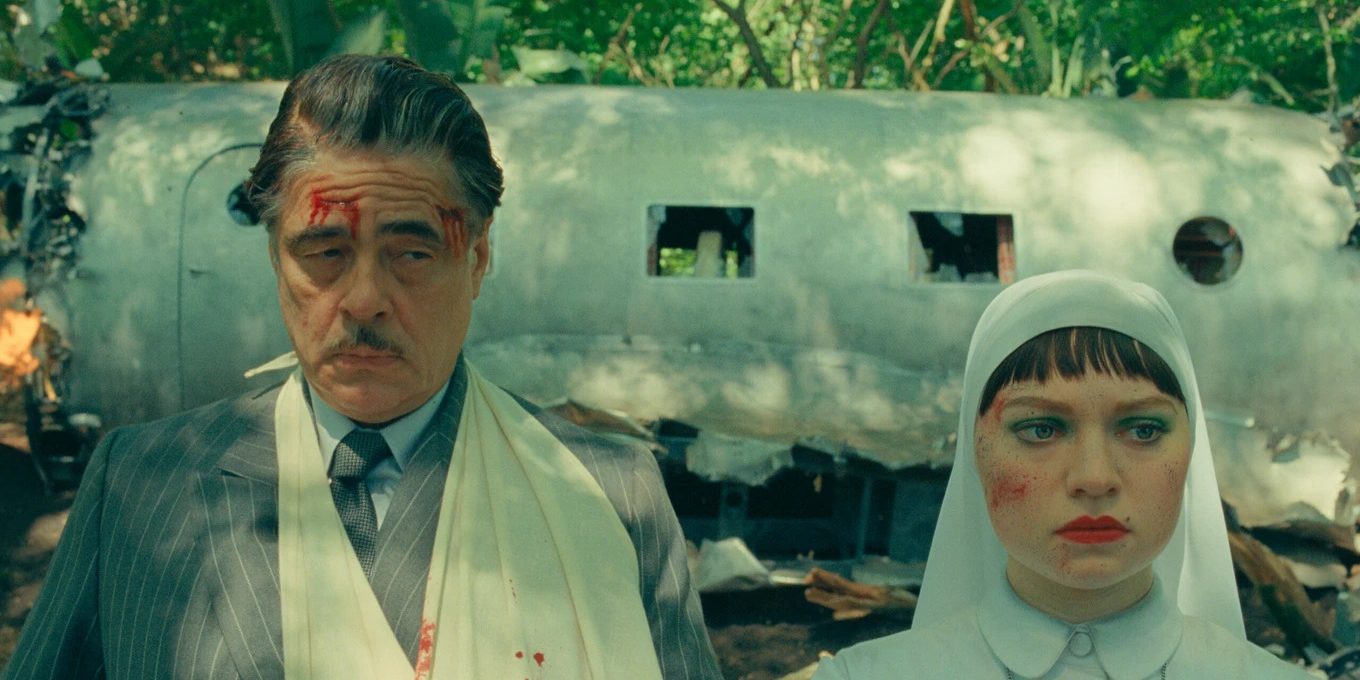PICK OF THE WEEK
The Phoenician Scheme
(Selected cinemas)
It is 1950, and the private plane of Anatole “Zsa-zsa” Korda (Benicio del Toro), who is engrossed in a book, cruises 5,000 feet over the “High Balkan Flatlands”. An explosion rips through the fuselage, cuts his administrative secretary in two, and forces a crash landing – the tycoon’s sixth, we are told.
Even as his death is reported on the news, he stumbles from a cornfield into shot, clutching a “vestigial organ” to his belly. A headline flashes on screen: “Ha! I’m still in the habit of surviving”.
Wes Anderson’s latest movie is one of his very best, not least because it is draped over the charisma of del Toro (for whom it was specifically written by the director and Roman Coppola). Based on the plutocrat Calouste Gulbenkian (1869-1955), aka “Mr Five Per Cent”, and Anderson’s late father-in-law, the Lebanese construction entrepreneur Fouad Mikhael Malouf (to whom the movie is dedicated), Korda is planning a mighty infrastructural project, the “Phoenician Land and Sea Infrastructure Scheme”, but must first secure the necessary finance, which he calls “the gap”.
Along for the trip is his 20-year-old daughter, Liesl (Mia Threapleton, terrific), a pipe-smoking novitiate nun from whom Zsa-zsa has been estranged for six years, but whom he how regards as his heir; and his Norwegian family tutor, Bjorn Lund (Michael Cera), now doubling up as his administrative secretary. Bjorn quickly falls for Liesl, who is initially more preoccupied by suspicions that Korda killed her mother (“I was very fond of your mother – and would never have murdered her under any circumstances whatsoever!”).
Though debonair and (mostly) unflappable, he is also a man of eccentric habits, offering those he encounters a hand grenade as a gift, and full of Darwinian mottos: “If something gets in your way, flatten it”; “Who could lick who, or whom, I guess”; “I don’t need any human rights”; and, cryptically, “Break, but don’t bend”. He has nine adopted sons, confined to a dormitory.
The investors visited by Zsa-zsa and Liesl are played by an extraordinary ensemble cast: Prince Farouk (Riz Ahmed), the 7th King of Lower Western Independent Phoenicia; the Sacramento Consortium, Leland (Tom Hanks) and Reagan (Bryan Cranston), with whom Korda and Farouk play a high-stakes basketball game; the fez-wearing “Marseille Bob” (Mathieu Amalric), the “Newark Syndicate”, represented by Marty (Jeffrey Wright); Korda’s second cousin, Hilda (Scarlett Johansson), to whom he proposes marriage; and his wicked younger half-brother, Nubar (Benedict Cumberbatch).
Such is Anderson’s cachet as an auteur that A-list actors now queue up for a cameo role in one of his movies. Rupert Friend plays “Excalibur”, leading a shadowy group of US government officials determined to destroy Korda by (among other secret ops) driving up the cost of “bashable rivets”.
At his palazzo, the mogul is attended by his butler (Alex Jennings), while Jason Watkins pops up occasionally to notarise a document. Richard Ayoade is Sergio, leader of a group of freedom fighters straight out of Luis Buñuel. In Zsa-zsa’s black-and-white near-death experiences, God is played (of course) by Bill Murray, alongside the celestial figures of Willem Dafoe and F Murray Abraham.
The narrative is punctuated by Anderson’s signature rectilinear tableaux – an overhead shot of a bathroom, a cabin on a ship, the interior of a plane – an aesthetic reminiscent of Peter Greenaway’s movies or the Bloomsbury Group’s fixation with “significant form”. What he himself has called his “visual handwriting” is sometimes criticised as too mannered or too predictable; but one has only to think of Douglas Sirk, John Ford or Andrei Tarkovsky to recall that many of the greatest directors have a distinctive cinematic sensibility.
It matters, too, that Anderson’s style is not chilly, but a means of fascinating and reeling us in so that we may be immersed in his surreal but sincere emotional universe. The heart of The Phoenician Scheme is Korda’s search for redemption as a parent, allied with his growing awareness that, independent of his schemes and avarice, “maybe I matter”; that, in the end, he must close “the emotional gap”.
Oscillating between apparent invulnerability and a sense of his mortality, he reaches for a better way of living and takes the audience with him. An absolute gem of a film.
FILM
Mission: Impossible – The Final Reckoning
(General release)
Does anyone now remember the original CBS television series of Mission: Impossible that ran from 1966 to 1973? Almost 30 years after Brian De Palma directed the first spin-off movie in 1996, the brand, which has already clocked up $4 billion at the box office, and its distinctive theme tune, have become inseparable from the superstardom of Tom Cruise.
This, the eighth instalment and the fourth to be directed by Christopher McQuarrie, is the franchise at its most entertainingly deranged and delivers in every way you might expect. Cruise, who turns 63 in July, returns as Ethan Hunt, the agent whose messianic capacity to save the world is now more reminiscent of Keanu Reeves’s Neo in the Matrix movies than an American James Bond.
Indeed, Angela Bassett, as US president Erika Sloane, is ready to defy the entire military-industrial complex as she entrusts Hunt personally with the preposterously difficult task of stopping an AI super-being called “the Entity” from triggering global nuclear apocalypse.
At his side once again are Benji (Simon Pegg), Luther (Ving Rhames) and Grace (Hayley Atwell); joined, this time, by Paris (Pom Klementieff) a former assassin who owes her life to Hunt. The plot, such as it is, sets them against the dastardly Gabriel (Esai Morales), and involves the matching of a cruciform key to the mysteriously named “Podkova” device.
All of which is really a MacGuffin to set up Cruise for a series of sprints across bridges, against-the-odds fight scenes and (of course) extraordinary stunts. These include breaking into a long-sunk Russian submarine deep below a polar ice cap and a biplane chase sequence that combines Buster Keaton gymnastics with Top Gun aeronautical action.
There are plenty of callbacks to the previous seven movies, as well as a blink-and-you’ll-miss-it reference to Robert Aldrich’s Kiss Me Deadly (1955). Is this truly the final Mission: Impossible? That’s classified.
BOOK
The Director, by Daniel Kelhmann
(Riverrun)
“The important thing is to make art under the circumstances one finds oneself in”: so says Daniel Kelhmann’s fictionalised version of the Austrian director G.W. Pabst (1885-1967) in this wonderful novel, published in Germany as Lichtspiel in 2023 and now translated by Ross Benjamin.
First in Hollywood, then in Austria after the Nazi annexation, Pabst is portrayed as hovering in a world of dream and nightmare, as if he himself is a character in an expressionist movie. Though he helps to launch the careers of Greta Garbo and Louise Brooks – the love of his life, in this account – he struggles in Tinseltown, mistaken for Fritz Lang and FW Murnau.
His encounter with Goebbels (not named, but unmistakable) has the quality of phantasmagoria: “the room had folded over so that he was suspended from the ceiling, walking upside down”. At his country estate, Pabst finds that the caretaker Jerzabek and his family are now zealous Nazis, and very far from deferential.
Meanwhile, the director’s son, Jakob, learns the art of brutality and the psychological surrender that are necessary to prosper in the Nazi era: “When you can’t do something and at the same time have no choice but to do it, there’s only one solution: have someone else do it. Someone who looks like you and who uses your body”.
PG Wodehouse, a prisoner of war, is a guest of the Reich at the premiere of Pabst’s Paracelsus (1943); as is Leni Riefenstahl, whom the English satirist describes as “a peculiarly spine-chilling creature”
As they work on The Molander Case (1945), Franz Wilzek, the director’s assistant, asks him whether he finds it strange “that we’re making a movie like this in the middle of the apocalypse”. As in Andres Veiel’s recent (and fantastic) documentary Riefenstahl, this is the heart of the matter: a question to which Pabst has no satisfactory answer and a dilemma superbly explored by Kehlmann in one of the best novels of the year.
STREAMING
Code of Silence
(ITVX, all episodes)
Four years since she won Strictly, and three since she left EastEnders, Rose Ayling-Ellis is now in the top rank of British dramatic actors. Weeks after her role in the BBC’s ground-breaking series Reunion, she stars in this compelling six-episode crime thriller, written by Catherine Moulton, as Alison Brooks, a deaf woman working in a police canteen in Canterbury, who becomes embroiled in an investigation because of her lip-reading skills.
In less confident hands, this could have been a patronising gimmick – but, as framed by Ayling-Ellis, who has been deaf since birth, and Moulton, who also has hearing loss, the concept works brilliantly. As Alison looks for cues, plosives and gestures, we watch the words forming on screen; and soon she becomes indispensable to DS Ashleigh Francis (Charlotte Ritchie) and her boss DI James Marsh (Andrew Buchan) as they pursue a gang planning a big jewellery heist.
In spite of warnings from the cops to stick to her specific role, Alison cannot help chasing the leads that her lip-reading delivers, and she soon finds herself talking to, and attracted by, the gang’s tech expert, Liam Barlow (Kieron Moore).
Her increasingly risky inquiries are made plausible by her exasperated longing to be taken seriously and for her sharp intelligence to be acknowledged. “I’m really fed up trying to prove myself,” she says, after losing yet another part-time job.
The villains – codenamed “Wolf”, “Hulk”, and “Cruella” – are properly nasty, too; though Liam is clearly cut from gentler cloth, which makes Alison all the more conflicted by her feelings about him. A first-class police drama, which fully deserves a second season.




